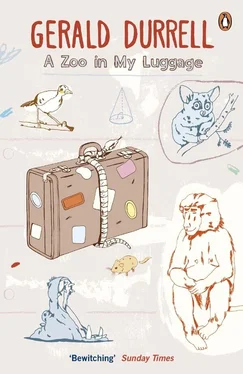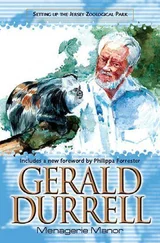Gerald Durrell - A Zoo in My Luggage
Здесь есть возможность читать онлайн «Gerald Durrell - A Zoo in My Luggage» весь текст электронной книги совершенно бесплатно (целиком полную версию без сокращений). В некоторых случаях можно слушать аудио, скачать через торрент в формате fb2 и присутствует краткое содержание. Жанр: Природа и животные, на английском языке. Описание произведения, (предисловие) а так же отзывы посетителей доступны на портале библиотеки ЛибКат.
- Название:A Zoo in My Luggage
- Автор:
- Жанр:
- Год:неизвестен
- ISBN:нет данных
- Рейтинг книги:4 / 5. Голосов: 1
-
Избранное:Добавить в избранное
- Отзывы:
-
Ваша оценка:
- 80
- 1
- 2
- 3
- 4
- 5
A Zoo in My Luggage: краткое содержание, описание и аннотация
Предлагаем к чтению аннотацию, описание, краткое содержание или предисловие (зависит от того, что написал сам автор книги «A Zoo in My Luggage»). Если вы не нашли необходимую информацию о книге — напишите в комментариях, мы постараемся отыскать её.
A Zoo in My Luggage — читать онлайн бесплатно полную книгу (весь текст) целиком
Ниже представлен текст книги, разбитый по страницам. Система сохранения места последней прочитанной страницы, позволяет с удобством читать онлайн бесплатно книгу «A Zoo in My Luggage», без необходимости каждый раз заново искать на чём Вы остановились. Поставьте закладку, и сможете в любой момент перейти на страницу, на которой закончили чтение.
Интервал:
Закладка:
My good friend,
I am glad that you have arrive once more to Bafut. I welcome you. When you are calm from your journeys come and see me.
Your good friend,
Fon of Bafut

Chapter Three. The Fon’s Beef

On our return from Eshobi, Jacquie and I loaded up our lorry with the cages of animals we had obtained to date, and set out for Bafut, leaving Bob and Sophie in Mamfe for a little longer to try and obtain some more of the rain-forest animals.
The journey from Mamfe to the highlands was long and tedious, but never failed to fascinate me. To begin with, the road ran through the thick forest of the valley in which Mamfe lay. The lorry roared and bumped its way along the red road between gigantic trees, each festooned with creepers and lianas, through which flew small flocks of hornbills, honking wildly, or pairs of jade-green touracos with magenta wings flashing as they flew. On the dead trees by the side of the road the lizards, orange, blue and black, vied with the pigmy kingfishers over the spiders, locusts and other succulent titbits to be found amongst the purple and white convolvulus flowers. At the bottom of each tiny valley ran a small stream, spanned by a creaking wooden bridge, and as the lorry roared across, great clouds of butterflies rose from the damp earth at the sides of the water and swirled briefly round the bonnet. After a couple of hours the road started to climb, at first almost imperceptibly, in a series of great swinging loops through the forest, and here and there by the side of the road you could see the giant tree-ferns like green fountains spouting miraculously out of the low growth. As one climbed higher, the forest gave way to occasional patches of grassland, bleached white by the sun.
Then, gradually, as though we were shedding a thick green coat, the forest started to drop away and the grassland took its place. The gay lizards ran sun-drunk across the road, and flocks of minute finches burst from the undergrowth and drifted across in front of us, their crimson feathering making them look like showers of sparks from some gigantic bonfire. The lorry roared and shuddered, steam blowing up from the radiator, as it made the final violent effort and reached the top of the escarpment. Behind lay the Mamfe forest, in a million shades of green, and before us was the grassland, hundreds of miles of rolling mountains, lying in folds to the farthest dim horizons, gold and green, stroked by cloud shadows, remote and beautiful in the sun. The driver eased the lorry on to the top of the hill and brought it to a shuddering halt that made the red dust swirl up in a waterspout that enveloped us and our belongings. He smiled the wide, happy smile of a man who has accomplished something of importance.
‘Why we stop?’ I inquired.
‘I go piss,’ explained the driver frankly, as he disappeared into the long grass at the side of the road.
Jacquie and I uncoiled ourselves from the red-hot interior of the cab and walked round to the back of the lorry to see how our creatures were faring. Phillip, seated stiff and upright on a tarpaulin, turned to us a face bright red with dust. His trilby, which had been a very delicate pearl grey when we started, was also bright red. He sneezed violently into a green handkerchief, and surveyed me reproachfully.
‘Dust too much , sah,’ he roared at me, in case the fact had escaped my observation. As Jacquie and I were almost as dusty in the front of the lorry, I was not inclined to be sympathetic.
‘How are the animals?’ I asked.
‘’E well, sah. But dis bush-hog, sah, ’e get strong head too much .’
‘Why, what the matter with it?’
‘’E done tief dis ma pillow,’ said Phillip indignantly.
I peered into Ticky the black-footed mongoose’s cage. She had whiled away the tedium of the journey by pushing her paw through the bars and gradually dragging in with her the small pillow which was part of our cook’s bedding. She was sitting on the remains, looking very smug and pleased with herself, surrounded by snow-drifts of feathers.
‘Never mind,’ I said consolingly, ‘I’ll buy you a new one. But you go watch your other things, eh? Sometime she go tief them as well.’
‘Yes, sah, I go watch um,’ said Phillip, casting a black look at the feather-smothered Ticky.
So we drove on through the green, gold and white grassland, under a blue sky veined with fine wisps of wind-woven white cloud, like frail twists of sheep’s wool blowing across the sky. Everything in this landscape seemed to be the work of the wind. The great outcrops of grey rocks were carved and ribbed by it into fantastic shapes; the long grass was curved over into frozen waves by it; the small trees had been bent, carunculated and distorted by it. And the whole landscape throbbed and sang with the wind, hissing softly in the grass, making the small trees creak and whine, hooting and blaring round the towering cornices of rock.
So we drove on towards Bafut, and towards the end of the day the sky became pale gold. Then, as the sun sank behind the farthest rim of mountains, the world was enveloped in the cool green twilight, and in the dusk the lorry roared round the last bend and drew up at the hub of Bafut, the compound of the Fon. To the left lay the vast courtyard, and behind it the clusters of huts in which lived the Fon’s wives and children. Dominating them all was the great hut in which dwelt the spirit of his father, and a great many other lesser spirits, looming like a monstrous, time-blackened beehive against the jade night sky. To the right of the road, perched on top of a tall bank, was the Fon’s Rest House, like a two-storey Italian villa, stone-built and with a neatly tiled roof. Shoe-box shaped, both lower and upper storeys were surrounded by wide verandahs, festooned with bougainvillaea covered with pink and brick-red flowers.
Tiredly we climbed out of the lorry and supervised the unloading of the animals and their installation on the top-storey verandah. Then the rest of the equipment was offloaded and stored, and while we made vague attempts to wash some of the red dust off our bodies, Phillip seized the remains of his bedding, his box full of cooking utensils and food and marched off to the kitchen quarters in a stiff, brisk way, like a military patrol going to quell a small but irritating insurrection. By the time we had fed the animals he had reappeared with an astonishingly good meal and having eaten it we fell into bed and slept like the dead.
The next morning, in the cool dawn light, we went to pay our respects to our host, the Fon. We made our way across the great courtyard and plunged into the maze of tiny squares and alleyways formed by the huts of the Fon’s wives. Presently, we found ourselves in a small courtyard shaded by an immense guava tree, and there was the Fon’s own villa, small, neat, built of stone and tiled with a wide verandah running along one side. And there, at the top of the steps running up to the verandah, stood my friend the Fon of Bafut.
He stood there, tall and slender, wearing a plain white robe embroidered with blue. On his head was a small skull-cap in the same colours. His face was split by the joyous, mischievous grin I knew so well and he was holding out one enormous slender hand in greeting.
‘My friend, Iseeya,’ I called, hurrying up the stairs to him.
‘Welcome, welcome … you done come … welcome,’ he exclaimed, seizing my hand in his huge palm and draping a long arm round my shoulders and patting me affectionately.
Читать дальшеИнтервал:
Закладка:
Похожие книги на «A Zoo in My Luggage»
Представляем Вашему вниманию похожие книги на «A Zoo in My Luggage» списком для выбора. Мы отобрали схожую по названию и смыслу литературу в надежде предоставить читателям больше вариантов отыскать новые, интересные, ещё непрочитанные произведения.
Обсуждение, отзывы о книге «A Zoo in My Luggage» и просто собственные мнения читателей. Оставьте ваши комментарии, напишите, что Вы думаете о произведении, его смысле или главных героях. Укажите что конкретно понравилось, а что нет, и почему Вы так считаете.










